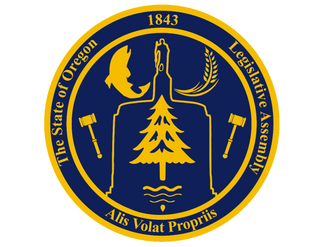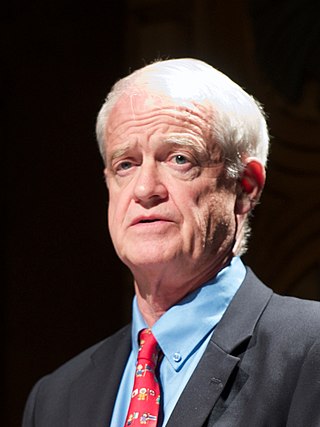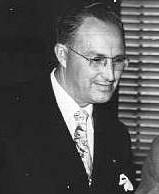Measure 16 of 1994 established the U.S. state of Oregon's Death with Dignity Act, which legalizes medical aid in dying with certain restrictions. Passage of this initiative made Oregon the first U.S. state and one of the first jurisdictions in the world to permit some terminally ill patients to determine the time of their own death.

The Register-Guard is a daily newspaper in the northwestern United States, published in Eugene, Oregon. It was formed in a 1930 merger of two Eugene papers, the Eugene Daily Guard and the Morning Register. The paper serves the Eugene-Springfield area, as well as the Oregon Coast, Umpqua River valley, and surrounding areas. As of 2019, it had a supposed circulation of 18,886 daily.

The Oregon Legislative Assembly is the state legislature for the U.S. state of Oregon. The Legislative Assembly is bicameral, consisting of an upper and lower house: the Senate, whose 30 members are elected to serve four-year terms; and the House of Representatives, with 60 members elected to two-year terms. There are no term limits for either house in the Legislative Assembly.

The secretary of state of Wisconsin is a constitutional officer in the executive branch of the government of the U.S. state of Wisconsin, and is second in the line of succession to the office of governor of Wisconsin. Twenty-nine individuals have held the office of secretary of state, two of whom have held non-consecutive terms. The incumbent is Sarah Godlewski, who was appointed by Governor Tony Evers on March 17, 2023, to replace long-time Secretary of State Doug La Follette.

Grattan Kerans was an American politician from Oregon, who served in the Oregon House of Representatives from 1974 through 1984, and in the Oregon State Senate from 1986 to 1993. He held the position of Speaker of the House during the 1983 legislative session.

Norma Jean Paulus was an American lawyer and politician in the state of Oregon. A native of Nebraska, she was raised in Eastern Oregon before becoming a lawyer. A Republican, she first held political office as a representative in the Oregon House of Representatives, and then became the first woman elected to statewide public office in Oregon when she became Oregon Secretary of State in 1977. Paulus later served as Oregon Superintendent of Public Instruction for nine years. She made unsuccessful bids to become Governor of Oregon and United States Senator. Prior to her death on February 28, 2019, Paulus lived in Portland, where she was involved with several non-profit groups and sponsored a ballot measure to create open primaries in Oregon's statewide elections.

The secretary of state of Oregon, an elected constitutional officer within the executive branch of the government of the U.S. state of Oregon, is first in the line of succession to the governor. The duties of the office are auditor of public accounts, chief elections officer, and administrator of public records. Additionally, the secretary of state serves on the Oregon State Land Board and chairs the Oregon Sustainability Board. Following every United States Census, if the Oregon Legislative Assembly cannot come to an agreement over changes to legislative redistricting, the duty falls to the secretary of state.

The Oregon Revised Statutes (ORS) is the codified body of statutory law governing the U.S. state of Oregon, as enacted by the Oregon Legislative Assembly, and occasionally by citizen initiative. The statutes are subordinate to the Oregon Constitution.

The Archives Division of the Office of the Secretary of State of Oregon, or the Oregon State Archives, is an agency of the Oregon Secretary of State charged with preserving and providing access to government records. The Oregon State Archives is open for research by appointment. It also publishes the Oregon Blue Book and Oregon Administrative Rules. The position of State Archivist was authorized by the state legislature in 1945, though not filled until 1947, and was originally a staff position within the Oregon State Library. The duties and functions of the archivist were placed under the purview of the Secretary of State in 1973, when that office was deemed the chief records officer of the state government by the legislature. As of 2019 it comprises the state archivist, a reference unit, a publications unit, an information and records management unit, and the State Records Center.

The Oregon Department of Aviation (ODAV) is an agency of the government of the U.S. state of Oregon chiefly responsible for matters relating to the continuing development of aviation as part of the state's transportation system, and the safety of its airways. In addition to operating the 28 airports owned by the State of Oregon, the department licenses more than 450 public or private airports, heliports and landing areas, and registers all pilots and non-military aircraft based within the state. Its activities include overseeing aviation system planning, providing administrative and technical support for community airport planning and development, administering an airport pavement maintenance program, providing small community aviation grants, and conducting aviation and public education programs.

Peter Michael Coleman Courtney is an American politician, lawyer, and professor who was a Democratic member of the Oregon State Senate, representing the 11th District since 1999. He served as President of the Senate from 2003 to 2023. He was a member of the Oregon House of Representatives in 1981, 1983, and from 1989 through 1998. Courtney previously taught at Western Oregon University.

Elections in Oregon are all held using a Vote by Mail (VBM) system. This means that all registered voters receive their ballots via postal delivery and can vote from their homes. A state Voters’ Pamphlet is mailed to every household in Oregon about three weeks before each statewide election. It includes information about each measure and candidate in the upcoming election.
The following table indicates the party of elected officials in the U.S. state of Oregon:

Earl T. Newbry was an American businessman and politician from the state of Oregon. A native of Colorado, he served as the twenty-fifth Secretary of State of Oregon after appointment by Oregon Governor John Hubert Hall. A Republican, he previously served two terms in the Oregon House of Representatives and three terms in the Oregon State Senate.

Monroe Mark Sweetland was an American politician in the state of Oregon. A native of the state, he served in both houses of the Oregon Legislative Assembly starting in 1953 for a total of ten years. A Democrat, he also twice ran and lost bids to serve as the Oregon Secretary of State and was a Democratic National Committeeman. Sweetland later served on the staff of the National Education Association, supporting passage of the Bilingual Education Act of 1968.
The rate of crime in Oregon, at least since 1985, has varied from below the United States national average to slightly above, depending on if one is looking at violent crime or property crime statistics. The violent crime rate remained below the national average every year between 1985 and 2022, while property crime generally remained above the average during that time. Every year between 2011 and 2020, Oregon maintained one of the 20 lowest violent crime rates in the United States. However, some of the most notorious serial killers in U.S. history were known for killing or operating in Oregon, including perhaps the most famous, Ted Bundy, as well as the second most prolific in terms of confirmed murders, Gary Ridgway, among many others.

George James Sweetland was an American physician as well as a coach of many sports including basketball, track and field and football at several universities.

The Oregon Naval Militia is the unorganized naval militia of the state of Oregon. As a naval militia, the Oregon Naval Militia was a reserve unit organized as a naval parallel to the Oregon National Guard.














